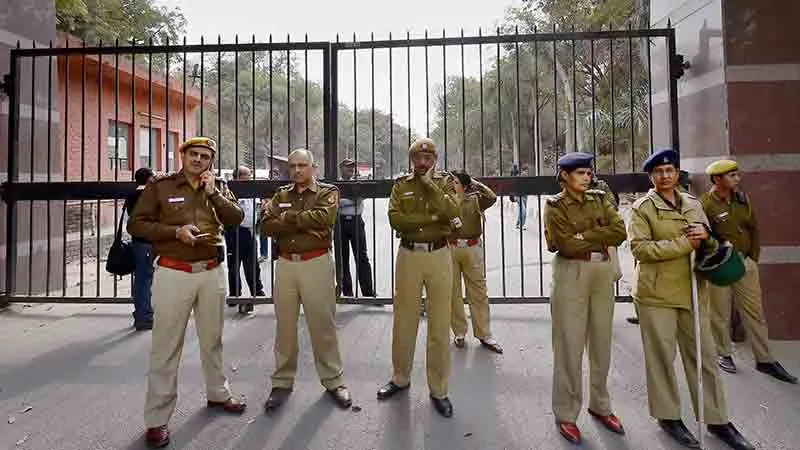The arrest of JNU Students’ Union President Kanhaiya Kumar for sedition, and its accompanying fallout is now descending into a tragicomic farce. The tragic happened < class="aBn" tabindex="0" data-term="goog_712338370">< class="aQJ">on Monday when BJP party men and lawyers attacked JNU students at the Patiala House courts, reportedly with the police standing by. The comic happened < class="aBn" tabindex="0" data-term="goog_712338371">< class="aQJ">on Saturday when seven students belonging to a theatre group were detained and interrogated in New Delhi, allegedly because they “looked like” JNU students. They were taken to the Parliament Street Police Station and let off later in batches. More than the alleged charges of abetting terrorists, the degeneration of the Delhi Police into a partisan body bodes ill for the future.
Leave alone reflect on issues, the police leadership has shown a marked tendency to adopt a completely partisan position on them. This is evident from the promptness with which the police arrested the JNU Students Union president on the basis of a complaint by a group of Akhil Bharatiya Vidyarthi Parishad (ABVP) students. Anyone with even the faintest acquaintance of Indian politics would know that Kumar, an activist of the All India Students Federation, close to the Communist Party of India, is unlikely to make common cause with any group of separatists. The AISF has been staunchly mainstream and has been a strong backer of the government on issues relating to separatism, unlike its cousin the Students Federation of India which has a nuanced stand supporting states’ rights.
Not surprisingly, the Patiala House incident was dismissed as “minor” by Delhi police chief B S Bassi, who has remained centre-stage in this whole affair. < class="aBn" tabindex="0" data-term="goog_712338372">< class="aQJ">On Sunday, he said that a Delhi Police alert based on a tweet allegedly from Hafiz Muhammad Saeed was issued to warn students to stay away from “anti-India” slogans.” The tweet on an account @HafeezSaeedJUD, spells Hafiz as “Hafeez”. Analysing the tweets, Praveen Swami pointed out in the Indian Express that it was not networked with other Jamaat ud Dawa accounts and that the @HafizSaeedJUD account had been suspended earlier along with some other accounts by Twitter.
Now, Bassi says that even a fake tweet merited attention because it was “sinister.” The uncharitable thought comes to mind that Bassi retires at the end of the month and has expressed his willingness to serve the nation even after retirement, if called upon to do so. As police chief, he would have served his office better by educating the public on the manner in which social media can be manipulated, rather than using a patently fake tweet to threaten students.
This is not the only controversy that has marred his term. At the end of last month, they were allegedly involved in bashing up a group of students protesting Rohith Vemula’s suicide in front of the RSS office in central Delhi. The brutal beating became public when a video showing some policemen, possibly, plainclothesmen beating up the students. Bassi says he has ordered a probe. A BJP-friendly daily next day showed pictures of police personnel who were allegedly injured by the students. So you can imagine where that inquiry is headed.
One feature that would be of keen interest to any police organisation that had a modicum of professionalism left, is to note how the social media is being used and manipulated to stoke protest. In the process tweets are being faked, and possibly video footage. It is unlikely that Kanhaiya Kumar was shouting any slogans in support of Afzal Guru, leave alone those allegedly calling for the destruction of India. Likewise a video purporting to show some ABVP activists shouting Pakistan Zindabad (Long live Pakistan) seems to be equally improbable.
These events have transpired in a university that is extremely small and diverse. But should this be repeated in other places and in a different setting, you could have a major law and order problem in your hands.
However, our police refuses to become a professional force and remains a hand-maiden of the powers that be. That suits the politicians and it is they who have consistently prevented any serious reform of the police system to take place. For this the BJP alone is not responsible, all political parties from the Congress to the CPI(M) have used and misused the police for their partisan purpose.
The saddest aspect of the whole situation is a word that will not be understood by our rashtravadi (nationalist) BJP. It is the word “bullying”. Taking on a handful of students and stomping all over them is no great sign of bravery. They show little of it in neighbouring Punjab, where the BJP forms part of the ruling coalition with the Akali Dal, and every now and then there are public functions where slogans in favour of Khalistan are raised, and killers of an Indian prime minister and a state chief minister honoured, yet, we don’t get a peep out of the bravehearts of the party.
This commentary originally appeared in Mid-Day.
The views expressed above belong to the author(s). ORF research and analyses now available on Telegram! Click here to access our curated content — blogs, longforms and interviews.




 PREV
PREV


